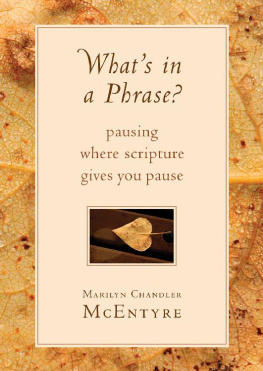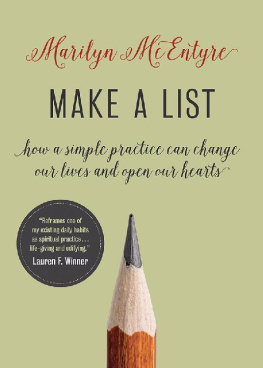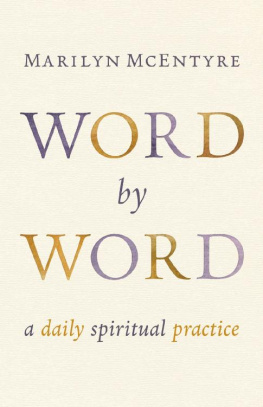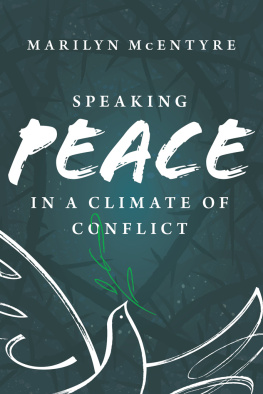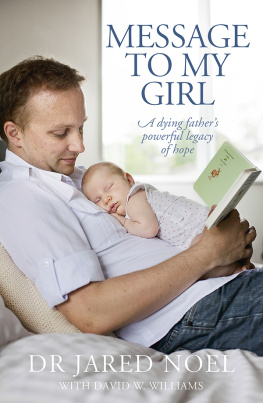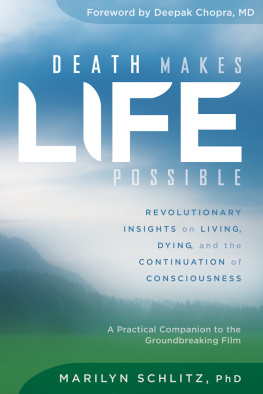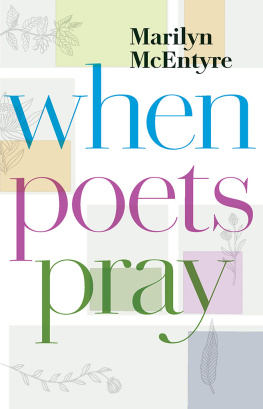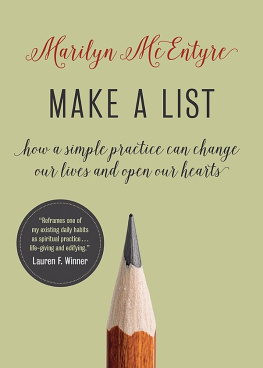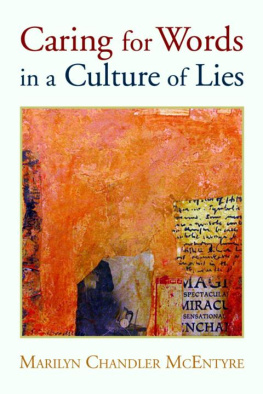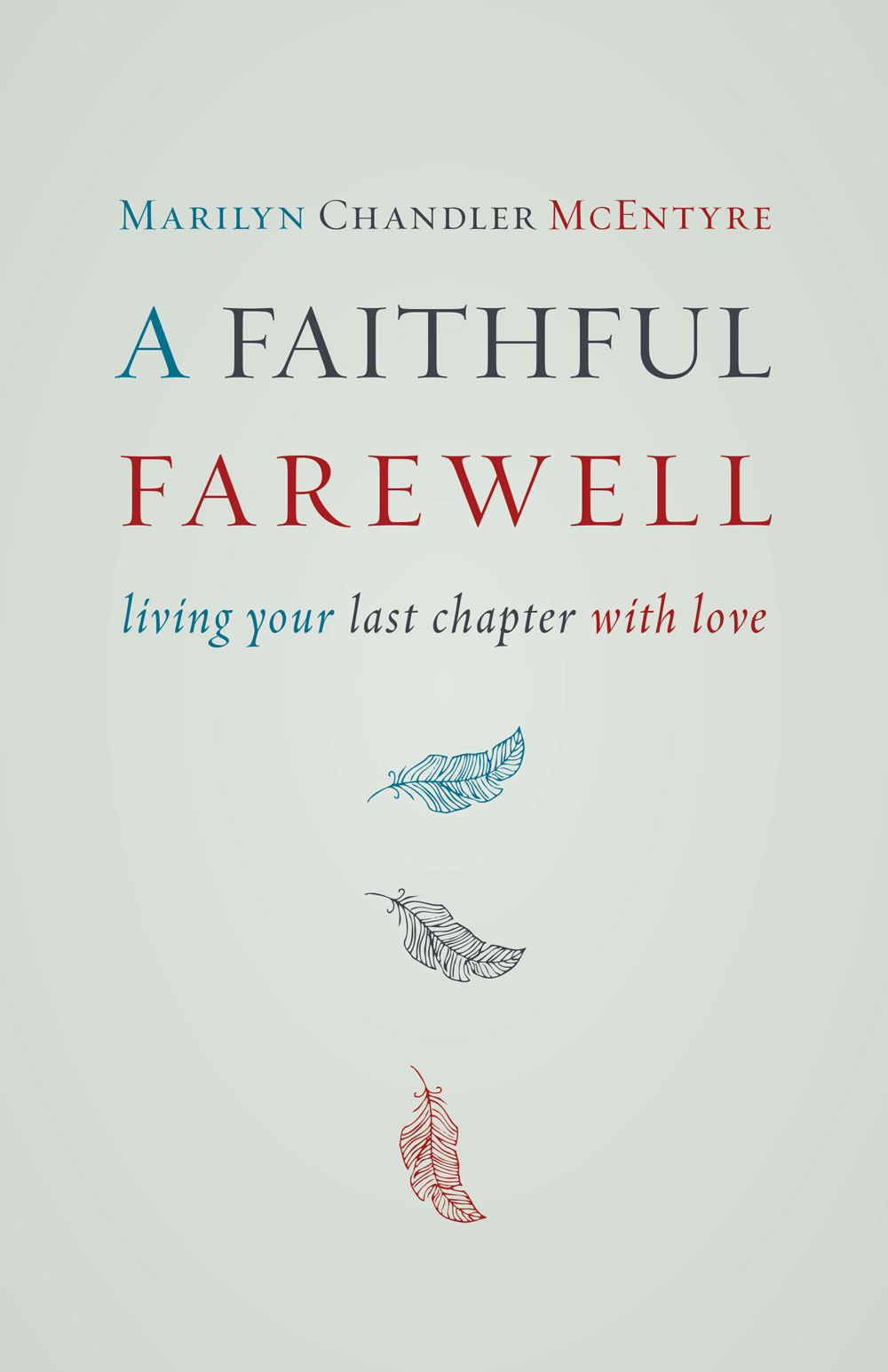A sensitive and helpful encouragement to those living life at its closure and to living it with openness, faithfulness, and hope. Beautifully done.
Harold G. Koenig
Duke University Medical Center
In accompanying the dying, McEntyre has come to know the myriad moments that mark the dying process. Her short reflections speak to over fifty facets of this journey in poignant and peace-filled prose. Accompanying prayers provide words for the dying to lean into, especially in moments when their own voice falters. A Faithful Farewell should prove equally helpful for family members, friends, chaplains, physicians, and other caregivers. All who walk with the dying in their final days should have a copy of this invaluable book.
M. Therese Lysaught
Institute of Pastoral Studies,
Loyola University Chicago
Marilyn Chandler McEntyre
A Faithful
Farewell
living your last chapter with love
William B. Eerdmans Publishing Company
Grand Rapids, Michigan / Cambridge, U.K.
2015 Marilyn Chandler McEntyre
All rights reserved
Published 2015 by
Wm. B. Eerdmans Publishing Co.
2140 Oak Industrial Drive N.E., Grand Rapids, Michigan 49505 /
P.O. Box 163, Cambridge CB3 9PU U.K.
Printed in the United States of America
Library of Congress Cataloging-in-Publication Data
McEntyre, Marilyn Chandler, 1949
A faithful farewell: living your last chapter with love /
Marilyn Chandler McEntyre.
pages cm
ISBN 978-0-8028-7260-9 (pbk.: alk. paper)
eISBN 978-1-4674-4314-2 (ePub)
eISBN 978-1-4674-4274-9 (Kindle)
1. Death Religious aspects Christianity. I. Title.
BT825.M355 2015
236.1 dc23
2014047779
www.eerdmans.com
This book is dedicated with awe and gratitude
to those whose dying has taught me not to be afraid,
but to approach the great mystery of our going with confidence and hope. It has been a privilege to walk
with them in the final days of their journeys.
And to John and our children and their families,
who give me ample reason to linger long
and gratefully in this life.
Whether in life or in death, we are the Lords.
Romans 14:8
Contents
Dealing with Dying
Some of us imagine that a merciful death is a swift one: no prolonged suffering, no time for fear, no pain of impending loss, no bearing the burden of others grief. One blow and its over. But we really have no way of knowing whether such a transition is more desirable than a gradual dying. And even if we could make that judgment, we dont generally get to choose the manner and time of our own death.
We live longer now, and many of us die more slowly. Medicine and medical technologies keep us alive in ways that introduce uncomfortable ethical ambiguities. We have choices our parents didnt have about treatment and care, including choices about how much of our care to consign to professionals and how to protect the intimacy and privacy of dying in the midst of loving people who gather to see us home.
This book is written for you who are facing that second kind of death. You know there is no likely cure for your condition. You may continue to pray for a miracle of healing, but you also know that healing is bigger than cure, and that it doesnt always mean prolonging this life. You know that illness and death bring new spiritual needs and enforce a different kind of hope.
And you know, as you live through this slow leave-taking, that dying involves a variety of difficulties, uncertainties, adjustments, and surprises. You have numerous things physical, emotional, and spiritual to deal with. Ive tried to identify and address some of those in these short reflections and prayers: discouragement, embarrassment, boredom, curiosity, loss of privacy, opportunities for new conversations, family conflict, indignities, small losses along the way, moments of new awareness, others mis-cued efforts to help, spiritual torpor, spiritual adventure, sadness, gratitude. Based on the hours Ive spent at the bedsides of those who are living their dying, and on reflections about my own aging and death, I have written these pieces in the first person, hoping that will give them an immediacy they might not have otherwise, and make them more a sharing of a common condition than advice from across the chasm that divides health from illness. We die with the dying, T. S. Eliot writes, and so I believe we do. I hope these pages will affirm a solidarity that makes every dying an opportunity to awaken and open the heart.
Peruse these pages as they seem to address your particular situation. Different reflections may be useful on different occasions. The prayers included at the end of each reading and those that are gathered in the final section are offered as prayers to lean into when finding your own words requires more energy than you have. I wrote them in the hope that they might not only serve you when you are moved to pray, but also serve as my prayers for you who are traveling a stretch of road toward a crossing we will all come to. The lines from hymns that follow the prayers are offered as invitations to recall the many ways that songs and hymns have sustained the life of faith, especially in hard times.
May you know yourself to be surrounded by a company of angels and a loving community of both dead and living as you approach this great transition and prepare for a faithful farewell.
What We Dreaded
So teach us to number our days
that we may get a heart of wisdom.
Psalm 90:12
Im sorry. Theres really nothing more the doctors can do. When I hear this, Im shocked, or afraid, or grim, or numb, or resigned. Whatever feeling takes over, I know life will never be the same. I know Im on the last leg of this journey, and though my family and friends will walk with me as far as they are able, Im coming up to a transition thats mine alone. Its my turn to do what every one of us gets to do leave the ones given me to love, leave the places on earth Ive called home, relinquish the ambitions that fueled my sense of purpose, and accept the work of conclusion and preparation.
Dying is work, as different for each of us, I imagine, as the labor of giving birth is different for every woman who bears new life into the world. I had seen birth and death, says the wise man in T. S. Eliots poem, but thought they were different. It turns out they are not so different. The process I face in what is likely to be a gradual and conscious death will no doubt be strenuous, unpredictable, surprising, and scary, and will require all my spiritual resources, which are probably far greater than I think they are.
The focus of my prayer life will have to sharpen. Though Ive tried to practice the presence of God, I will come into Gods presence now with new urgency, heightened eagerness, and also ambivalence and anxiety and sometimes anger. Whatever my condition when I show up, I have to trust that God will meet me there, providing what I need for each demanding day of this process.
The conversations I need to have now will offer opportunities for a new level of honesty that may bring new intimacy and freedom between me and those I love. Poems and journals Ive read that were written in the months and weeks before death often testify to moments of epiphany or deep peace or complete forgiveness. Sometimes such moments come like gifts, as graceful and simple as the soft fall of a leaf. Sometimes they come in dreams.
I know that the Spirit who meets us the very moment we open listening hearts is near and ready. I know that whatever time I have will be time enough. What most deeply needs to happen can happen. There is a biblical wisdom to King Lears famous line: Men must endure their going hence, even as their coming hither. Ripeness is all. We come and we go in the fullness of time.


